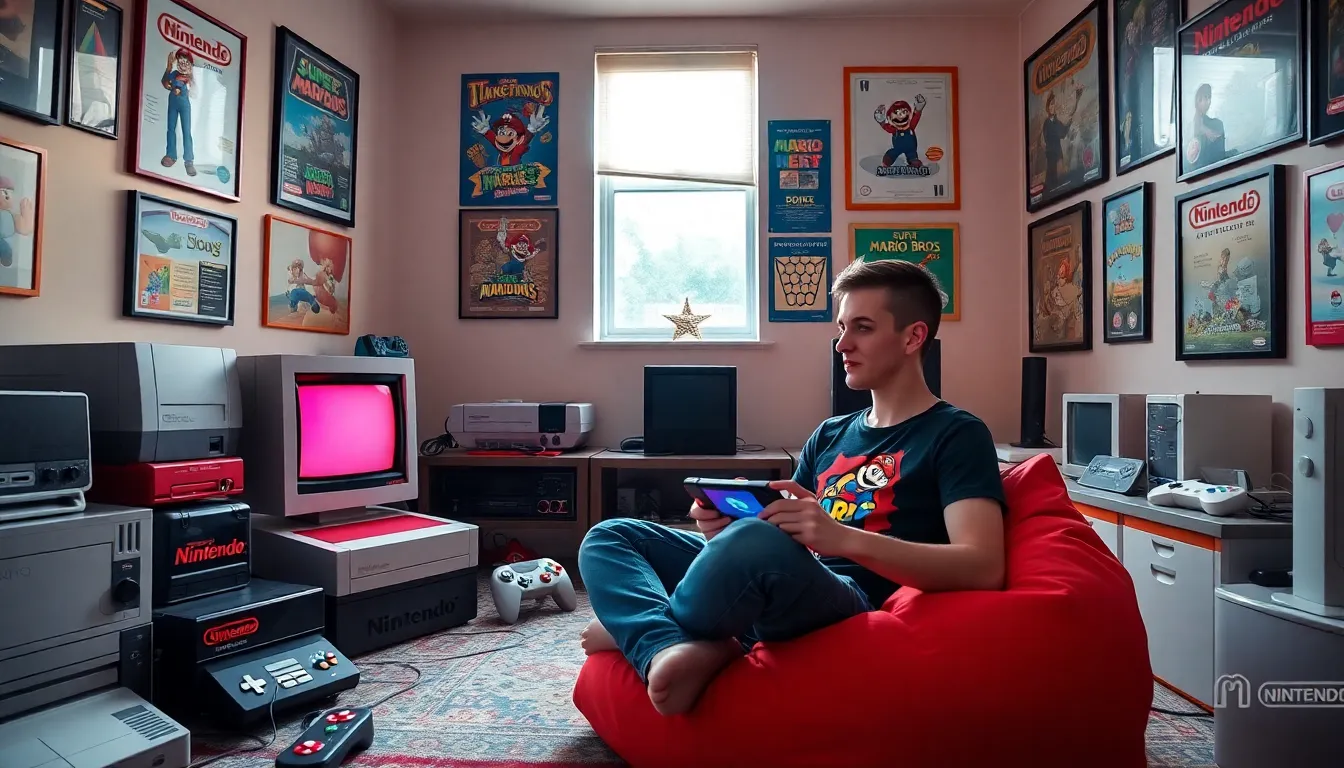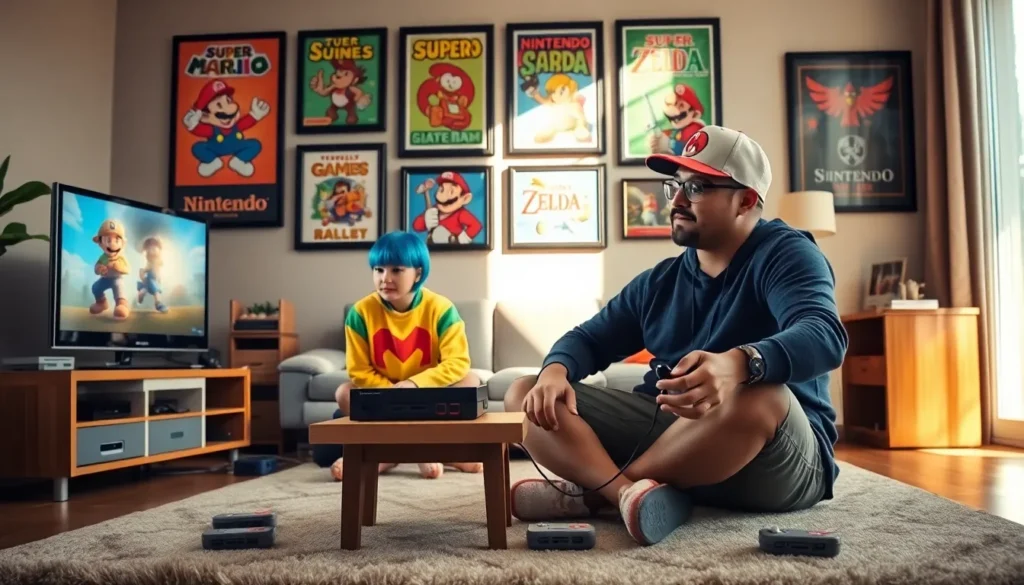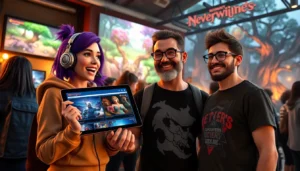Nintendo has stood the test of time to become one of the most beloved and influential gaming companies in history. Its innovative consoles and iconic game franchises have captivated millions, inspiring generations of gamers. In this exploration, we investigate into Nintendo’s evolution, its impact on game design, the cultural significance of its franchises, and where the company is headed in the future. Join us as we journey through the rich and vibrant world of Nintendo gaming.
Table of Contents
ToggleThe Evolution Of Nintendo Gaming

Nintendo has seen numerous transformations since its inception in 1889. Originally a playing card company, Nintendo entered the video game realm in the 1970s, paving the way for a revolution in gaming.
Key Milestones In Nintendo’s History
Throughout the decades, Nintendo has marked several significant milestones.
- Release of the NES (1983): The Nintendo Entertainment System redefined home gaming, dominating markets and introducing classics like Super Mario Bros and The Legend of Zelda.
- The Birth of 3D Gaming (1996): With the release of the Nintendo 64, players experienced Mario in a 3D environment for the first time. Games like GoldenEye 007 and Super Smash Bros became instant classics.
- Revolutionizing Handheld Gaming (2004): The Nintendo DS brought dual screens and touch capabilities, engaging audiences with innovative titles such as Nintendogs and Brain Age.
- The Wii’s Motion Control (2006): The Wii shifted the gaming landscape with its intuitive motion controls, appealing to a broad audience, including non-gamers.
The release of the Nintendo Switch in 2017 further solidified Nintendo’s place in the industry, blending home and handheld gaming seamlessly.
Impact Of Nintendo Consoles Over The Years
Each Nintendo console has left an indelible mark on gaming culture. The NES not only brought video games into households but also created a new language for game design and storytelling. With its innovative 3D graphics, the Nintendo 64 allowed players to experience games in ways previously thought impossible, while the Wii popularized gaming as a social activity, proving accessible for all ages. Today, the Switch continues this legacy, allowing players to enjoy their favorite titles anytime, anywhere, further enhancing the gaming experience, so solidifying its role as a pioneer in the ever-evolving landscape of gaming.
Nintendo’s Influence On Game Design
Nintendo has been a beacon of creativity and innovation in game design, influencing countless developers and shaping the gaming industry as a whole.
Innovative Gameplay Mechanics
Nintendo has consistently pushed boundaries in gameplay mechanics, introducing concepts that have become staples across the industry.
- The Mario Jump: Mario’s iconic jump mechanic, for instance, has inspired platformers globally. Players learned that simple, yet effective mechanics can provide hours of entertainment.
- Puzzle Elements in The Legend of Zelda: The franchise integrated puzzle-solving into gameplay, encouraging players to think critically to progress through engaging narratives.
- Use of Motion Controls: The Wii introduced motion-sensing technology, leading developers to rethink how players interact with games, creating a new category of physical gaming experiences.
Nintendo’s willingness to experiment with form and function has made its games highly regarded for both their design and depth.
Narrative Techniques And Character Development
Nintendo has also led the charge in narrative development, focusing on character design and emotional engagement.
- Relatable Characters: Iconic characters like Link and Princess Zelda are designed with depth, creating relatable stories that resonate with players.
- World-Building: Titles such as Animal Crossing provide immersive worlds where players can explore narratives at their own pace, enhancing engagement.
This attention to detail in character and storyline not only makes each game memorable but also ensures that players remain emotionally invested in the Nintendo universe.
The Cultural Impact Of Nintendo Franchises
The cultural footprint of Nintendo cannot be overstated. Its franchises have created not just games but a way of life for millions.
Iconic Characters And Their Legacy
Nintendo’s characters are cultural icons, often recognized worldwide.
- Mario and Luigi: The plumber brothers have transcended gaming, appearing in various media and merchandise, symbolizing the fun and imaginative spirit of Nintendo.
- Link and Zelda: Their adventures have fostered a deep emotional connection with fans, solidifying their place in pop culture.
These characters have not only captured hearts: they’ve defined what it means to be a Nintendo fan.
Community And Multiplayer Experiences
Nintendo has fostered community engagement like few others, especially through multiplayer experiences.
- Local Multiplayer on the Wii and Switch: Games like Mario Kart and Super Smash Bros have become staples of social gatherings, bringing friends and families together to compete and enjoy.
- Online Play: With the advent of the Nintendo Switch, the company has improved its online capabilities, allowing for greater interaction through multiplayer gameplay.
Through these experiences, Nintendo has created a unique sense of community among its players, reinforcing the idea that gaming is best enjoyed together.
Exploring The Future Of Nintendo Gaming
Looking ahead, the future of Nintendo gaming is as intriguing as its past. What can players expect in the coming years?
Upcoming Titles And Trends To Watch
The pipeline for Nintendo releases is consistently robust. Anticipated titles include:
- The Legend of Zelda: Breath of the Wild 2: Building on the success of its predecessor, expectations are high for an expanded world and deeper narrative.
- New IPs: Nintendo has hinted at exploring original concepts that could push the boundaries of gaming even further.
As technology evolves, so too will Nintendo’s approach to gaming, embracing new trends while staying true to its core values.
The Role Of Nostalgia In Gaming
Nostalgia plays a powerful role in gaming, especially for Nintendo fans.
- Remakes and Remasters: Titles like Super Mario All-Stars and Link’s Awakening illustrate how beloved franchises can be revitalized for new audiences while retaining their original charm.
- Legacy of Classic Games: Nintendo continually celebrates its past, providing older titles through services like Nintendo Switch Online, ensuring that new generations can experience the magic of earlier games.
This blend of nostalgia with innovation will shape the future of Nintendo, keeping both veteran gamers and newcomers engaged with its evolving library.
Conclusion
Nintendo’s timeless appeal stems from its ability to adapt, innovate, and resonate emotionally with gamers. From the evolution of gaming consoles to its profound influence on game design, Nintendo has crafted a remarkable legacy. As it moves forward, embracing both nostalgia and innovation, the company is poised to continue influencing generations of gamers. The joy and camaraderie that Nintendo fosters through its characters and multiplayer experiences create a lasting impact that only time can define. For gamers, both new and seasoned, the world of Nintendo remains a captivating adventure.





